Q&A w/ author, Carl Hart – HIGH PRICE: A Neuroscientist’s Journey of Self-Discovery that Challenges Everything You Know about Drugs and Society
Written on June 18th, 2013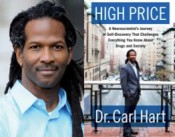 |
Aired: 06/16/13
This week’s guest, neuroscientist CARL HART grew up in one of Miami’s toughest neighborhoods and, in his first book, HIGH PRICE, he explores how it is that he avoided becoming one of the crack addicts he now studies.
Columbia University’s first tenured African American professor in the sciences, Hart goes beyond disputing myths, falsehoods, and ignorance about drugs, drug users, and drug policy. He has been engaged in cutting edge research since the late 90s, testing individuals with actual drugs. His controversial work is redefining our understanding of addiction. He examines the relationships between drugs, pleasure, choice, and motivation, both in the brain and in society. Hart’s findings shed new light on issues of race, poverty, and drugs, and help explain perhaps more clearly than ever why current policies are doomed to fail.
www.highpricethebook.com
Q&A: STEPHEN GREENBLATT, National Book Award Winner, THE SWERVE: How the World Became Modern
Written on January 21st, 2012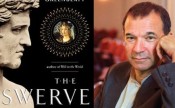 |
Aired 01/15/12
In the winter of 1417, a short, genial, cannily alert man in his late thirties plucked a very old manuscript off a library shelf, saw with excitement what he had discovered, and ordered that it be copied. The man was Poggio Braccionlini, the greatest book hunter of the Renaissance. His discovery was the last surviving manuscript of an ancient Roman philosophical epic, On the Nature of Things by Lucretius—a beautiful poem of the most dangerous ideas: that the universe functioned without the aid of gods, that religious fear was damaging to human life, and that matter was made up of very small particles in eternal motion, colliding and swerving in new directions.
The copying and translation of this ancient book fueled the Renaissance, inspiring artists such as Botticelli and thinkers such as Giordano Bruno; shaped the thought of Galileo and Freud, Darwin and Einstein; and had a revolutionary influence on writers such as Montaigne and Shakespeare and even Thomas Jefferson.
Stephen Greenblatt is John Cogan University Professor of the Humanities at Harvard University. Among his books are Will of the World: How Shakespeare Became Shakespeare, a Finalist for the 2004 National Book Award in Nonfiction and a New York Times best seller, and Hamlet in Purgatory. He holds honorary degrees from Queen Mary College of the University of London and the University of Bucharest.
Q&A: ESTHER DUFLO, Professor of Economics at MIT
Written on April 28th, 2011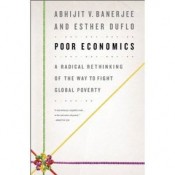 |
Aired 04/24/11
ESTHER DUFLO, a Professor of Economics at MIT, has received numerous honors including a John Bates Clark Medal for the best American economist under 40 in 2010, a MacArthur "genius" Fellowship in 2009. She was recognized as one of the best eight young economists by the Economist Magazine, one of the 100 most influential thinkers by Foreign Policy, and one of the "forty under forty" most influential business leaders under forty by Fortune magazine in 2010.
Together with Abhijit Banerjee and Sendhil Mullainathan of Harvard University, she founded the Abdul Latif Jameel Poverty Action Lab in 2003, and authored with Banerjee, the new book, POOR ECONOMICS: A Radical Rethinking of the Way to Fight Global Poverty
Q&A: ROBERT THURMAN, Author and Tibetan monk
Written on April 28th, 2011
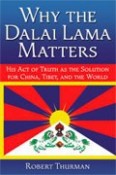 |
Aired 04/24/11
ROBERT THURMAN, the author of more than 20 books and the first American ordained as a Tibetan monk by his friend of more than 40 years, the Dalai Lama, is Professor of Indo-Tibetan Buddhist Studies at Columbia University, President of Tibet House US, a non-profit dedicated to preserving and promoting Tibetan civilization.
Q&A: JON KABAT-ZINN, Professor of Medicine – Author
Written on September 21st, 2010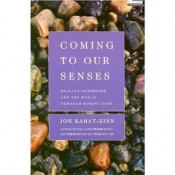 |
Aired 09/19/10
JON KABAT-ZINN, Ph.D. is Professor of Medicine Emeritus at the University of Massachusetts Medical School, where he was founder of the Center for Mindfulness in Medicine, Health Care, and Society, and founding Director of its world-renowned Stress Reduction Clinic. In 1993, his work in the Stress Reduction Clinic was featured in Bill Moyer's PBS Special, Healing and the Mind. He's the author of Full Catastrophe Living: Using the Wisdom of Your Body and Mind to Face Stress, Pain and Illness; Wherever You Go, There You Are: Mindfulness Meditation in Everyday Life; Coming to Our Senses: Healing Ourselves and the World Through Mindfulness.
Dr. Kabat-Zinn's work has contributed to a growing movement of mindfulness within mainstream institutions in medicine, law, education, business, corrections, and sports. Over 200 medical centers and clinics nationwide and abroad now use his Mindfulness-Based Stress Reduction
Jon was a guest a couple of times before on this show. On one of those occasions, he was joined by his wife Myla Kabat Zinn, and we talked about mindful parenting and the book they wrote together, Everyday Blessings, which I highly recommend. By the way, the Zinn in both their names is her maiden name. Myla's father is the late historian and activist, Howard Zinn.
TRUCY GOODMAN, Ph.D., has trained and practiced in two fields for over 25 years: meditation and psychotherapy. She studied developmental psychology with Jean Piaget, Lawrence Kohlberg, and Carol Gilligan, and trained with psychiatrist/psychoanalyst Richard Chasin, MD. For 20 years, Trudy worked with children, teenagers, couples and individuals in a full psychotherapy practice. Since 1974, Trudy devoted much of her life to practicing Buddhist meditation. She taught mindfulness with Jon Kabat-Zinn in the early days of the MBSR (Mindfulness-Based Stress Reduction) clinic at University of Massachusetts Medical School in Worcester.
